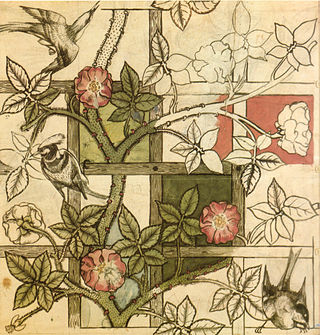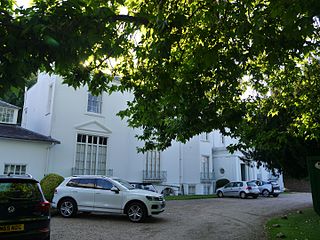Related Research Articles

The environmental movement is a social movement that aims to protect the natural world from harmful environmental practices in order to create sustainable living. Environmentalists advocate the just and sustainable management of resources and stewardship of the environment through changes in public policy and individual behavior. In its recognition of humanity as a participant in ecosystems, the movement is centered on ecology, health, as well as human rights.

The Arts and Crafts movement was an international trend in the decorative and fine arts that developed earliest and most fully in the British Isles and subsequently spread across the British Empire and to the rest of Europe and America.
The Royal Society for the Prevention of Cruelty to Animals (RSPCA) is a charity operating in England and Wales which promotes animal welfare. The RSPCA is funded primarily by voluntary donations. Founded in 1824, it is the oldest and largest animal welfare organisation in the world, and is one of the largest charities in the UK. The organisation also does international outreach work across Europe, Africa and Asia.

The DPT vaccine or DTP vaccine is a class of combination vaccines to protect against three infectious diseases in humans: diphtheria, pertussis, and tetanus (lockjaw). The vaccine components include diphtheria and tetanus toxoids, and either killed whole cells of the bacterium that causes pertussis or pertussis antigens. The term toxoid refers to vaccines which use an inactivated toxin produced by the pathogen which they are targeted against to generate an immune response. In this way, the toxoid vaccine generates an immune response which is targeted against the toxin which is produced by the pathogen and causes disease, rather than a vaccine which is targeted against the pathogen itself. The whole cells or antigens will be depicted as either "DTwP" or "DTaP", where the lower-case "w" indicates whole-cell inactivated pertussis and the lower-case "a" stands for "acellular". In comparison to alternative vaccine types, such as live attenuated vaccines, the DTP vaccine does not contain any live pathogen, but rather uses inactivated toxoid to generate an immune response; therefore, there is not a risk of use in populations that are immune compromised since there is not any known risk of causing the disease itself. As a result, the DTP vaccine is considered a safe vaccine to use in anyone and it generates a much more targeted immune response specific for the pathogen of interest.

The Advertising Council, commonly known as Ad Council, is an American nonprofit organization that produces, distributes, and promotes public service announcements or PSAs on behalf of various sponsors, including nonprofit organizations, non-governmental organizations and agencies of the United States government.

Beautiful Joe is an 1893 novel by Margaret Marshall Saunders which contributed to worldwide awareness of animal cruelty. The story is based on a dog of the same name from the town of Meaford, Ontario.

Environmentalism or environmental rights is a broad philosophy, ideology, and social movement about supporting life, habitats, and surroundings. While environmentalism focuses more on the environmental and nature-related aspects of green ideology and politics, ecologism combines the ideology of social ecology and environmentalism. Ecologism is more commonly used in continental European languages, while environmentalism is more commonly used in English but the words have slightly different connotations.

Visual pollution refers to the degradation of the visual environment due to unattractive or disruptive elements that negatively impact the aesthetic quality of an area. It can affect urban, suburban, and natural landscapes. It also refers to the impacts pollution has in impairing the quality of the landscape, formed from compounding sources of pollution to create the impairment. Visual pollution disturbs the functionality and enjoyment of a given area, limiting the ability for the wider ecological system, from humans to animals, to prosper and thrive within it due to the disruptions to their natural and human-made habitats. Although visual pollution can be caused by natural sources, the predominant cause comes from human sources.

North Macedonia is a signatory to the European Convention on Human Rights and the U.N. Geneva Convention relating to the Status of Refugees and Convention against Torture, and the Constitution of North Macedonia guarantees basic human rights to all citizens.

Sir Malcolm David Evans, is an English legal scholar. He is currently Principal of Regent's Park College, Oxford, England and started in 2023.
Scapa may refer to:
Title 42 of the United States Code is the United States Code dealing with public health, social welfare, and civil rights. Parts of Title 42 which formerly related to the US space program have been transferred to Title 51.

Tobacco politics refers to the politics surrounding the use and distribution of tobacco, likewise with regulations.

Tobacco control is a field of international public health science, policy and practice dedicated to addressing tobacco use and thereby reducing the morbidity and mortality it causes. Since most cigarettes and cigars and hookahs contain/use tobacco, tobacco control also concerns these. E-cigarettes do not contain tobacco itself, but (often) do contain nicotine. Tobacco control is a priority area for the World Health Organization (WHO), through the Framework Convention on Tobacco Control. References to a tobacco control movement may have either positive or negative connotations, depending upon the commentator.

Regulation of tobacco by the U.S. Food and Drug Administration began in 2009 with the passage of the Family Smoking Prevention and Tobacco Control Act by the United States Congress. With this statute, the Food and Drug Administration (FDA) was given the ability to regulate tobacco products.
Domestic violence in Pakistan is an endemic social and public health problem. According to a study carried out in 2009 by Human Rights Watch, it is estimated that between 10 and 20% of women in Pakistan have suffered some form of abuse. Women have reported attacks ranging from physical to psychological and sexual abuse from intimate partners. A survey carried out by the Thomson Reuters Foundation ranked Pakistan as the sixth most dangerous country for women while India ranked 1st as the most dangerous country for women. Given the very few women's shelters in the country, victims have limited ability to escape from violent situations.

The Selborne Society or Selborne League is Britain's oldest national conservation organization and a registered charity. It was formed in November 1885 to "perpetuate the name and interests of Gilbert White, the Naturalist of Selborne", and followed the philosophy of observation rather than collection. Its object was the preservation of birds, plants and pleasant places.

Richardson Evans was a British civil servant, journalist and author.
Beny Jene Primm was a prominent American physician, HIV/AIDS researcher, lecturer, and advocate for public health policy reform.
References
- 1 2 3 Rollins, William H. (1997). "Aesthetic perception and environmental reform in modern Europe". A greener vision of home : cultural politics and environmental reform in the German Heimatschutz movement, 1904-1918. University of Michigan Press. pp. 64–67. ISBN 9780472108091.
- 1 2 Fletcher, Winston (2010). "The Good, the Bad and the Ugly". Advertising : a very short introduction. Oxford University Press. ISBN 9780191614279.
- ↑ Nevett, Terry (1981). "The Scapa society: The first organised reaction against advertising". Media, Culture & Society. 3 (2): 179–187. doi:10.1177/016344378100300207. S2CID 143994207.
- ↑ Vang, Pamela, 1953- (2014). Good guys : a cultural semiotic study of the print advertising of the oil industry (1900-2000). Linköpings universitet. Institutionen för kultur- och kommunikation. Linköping: Department of Culture and Communication, Linköping University. pp. 87, 91–92. ISBN 978-91-7519-318-2. OCLC 941607357.
{{cite book}}: CS1 maint: multiple names: authors list (link) CS1 maint: numeric names: authors list (link) - 1 2 Licence, Tom (2016). What the Victorians Threw Away. Oxbow Books. p. 16. ISBN 978-1-78297-878-7 . Retrieved 25 February 2020.
- ↑ "Catalogue record for: A beautiful world : the journal of the Society for Checking the Abuses of Public Advertising". Library Hub Discover. Jisc. Retrieved 25 February 2020.
- ↑ "Folder entitled Scapa - Society for the Prevention of Disfigurement in Town and Country (now called Advisory Council for the Control of Outdoor Advertising)". The National Archives. Retrieved 25 February 2020.